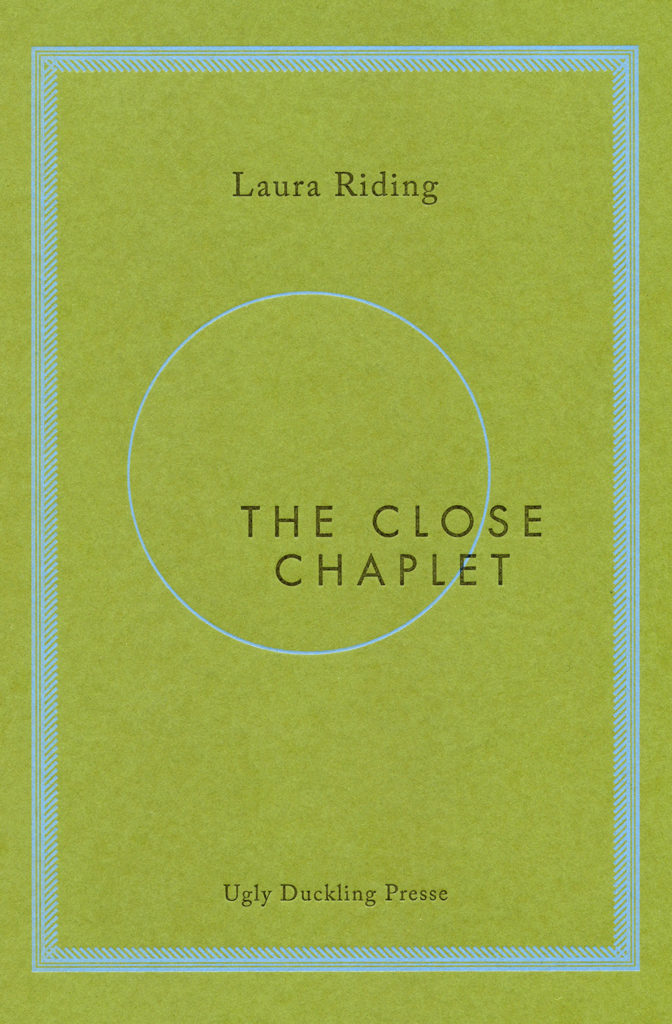Ugly Duckling Presse 2018
232 3rd St #E-303
Brooklyn NY 11215
347-948-5170

The Close Chaplet
Laura Riding
Edited by Mark Jacobs
July 2020
PRISMS
What is beheld through glass seems glass.
The quality of what I am
Encases what I am not,
Smooths the strange world.
I perceive it slowly
In my time,
In my material,
As my pride,
As my possession:
The vision is love.
When life crashes like a cracked pane,
Still shall I love
Even the slight grass and the patient dust.
Death also sees, though darkly,
And I must trust then as now
Only another kind of prism
Through which I may not put my hands to touch.
... not so much spells as acts of verbal disenchantment, inspired unravellings of the world's riddle.
Robert Nye
The Close Chaplet is Laura Riding’s first book, long out of print, originally published in 1926. Riding deliberately ceased writing poems after 1940, when she came to see poetry as irrevocably flawed as a means of expression. These poems demonstrate Riding’s early desire to depart from “the close and well-tilled ground” of traditional lyric poetry.
In his introduction, Mark Jacobs writes that Riding “identifies herself with the pre-moment, the ‘what was there’ before Creation.” From this she begins to develop a theory about the role of women as the origin of all human beings, the only animals with written language. This edition also includes Riding’s essay “A Prophecy or a Plea,” a statement of her poetics initially published in the same year.
The publication of this book was made possible, in part, by a grant from the New York State Council on the Arts, a state agency.
About the Author
Laura Riding was a poet, novelist, short-story writer, essayist, and publisher. While primarily known for the critical works that she co-authored with Robert Graves—A Pamphlet Against Anthologies and A Survey of Modernist Poetry—Riding also left behind an incredibly powerful body of poetry and prose works that, regrettably, remain little read today. These include The Close Chaplet, The Lives of Wives, and The Progress of Stories. Famously rejecting poetry early in her career, she spent the last decades of her life co-writing a theoretical work on linguistics, Rational Meaning, with her husband Schuyler Jackson. She was awarded the Bollingen Prize in 1991, the very same year she died.
Praise
In poetry’s eternal return, we might imagine Laura Riding as the child of Gertrude Stein and William Blake, figures of radical resistance to a normative (patriarchal) poetics, eschewing both empirical observations of a knowable world and the interior meditations of a searching self. Awkwardly dissonant and often mysteriously opaque, Riding’s poems are restless experiments, in which language is a genderless force, refuting ordinary epistemologies of meaning. Nearly a century after they were written, the poems in The Close Chaplet (1926) offer contemporary readers a raw encounter with the elemental quid as it seeks to capture ‘new surprise and spirit.
Ann Lauterbach
The Close Chaplet contains Laura Riding’s early poems about being a woman and being a poet, topics that anticipated second and third wave feminist writing. Here we see the fierce intelligence and linguistic precision that attracted disciples. Mark Jacobs provides an insightful introduction to Riding’s ideas and career.
Joyce Wexler
Here in The Close Chaplet, in “To No Reply,” the poet wonders about audience, which at the time was made of men, primarily. She doesn’t need their “Reply.” This is about her, a going “Out to the spot where vision should arrive” and what she has to say there. “To slip a word in,” she says, “Were to make a mouth,” and her words “break / The patent silence.” We today can make a wide audience. Reread this book.
Logan Esdale
I…derived considerable courage from Laura Riding’s self-determination, and the proof this collection gives that those who refuse compromise or write what the public thinks it wants are not obliged to back down. Laura Riding is very brave.
Marianne Moore
No North American or European poet of this century has created a body of work that reflects more deeply on the inherent conflicts between truth-telling and the inevitable artifice of poetry than Laura (Riding) Jackson.
Charles Bernstein
... as the words and their rhythms worked upon me and then within me, I found in due course that here were not so much spells as acts of verbal disenchantment, inspired unravellings of the world's riddle.
Robert Nye
Laura Riding was one of the most important English-speaking poets of the 20th century. In Jack Blackmore and Mark Jacobs her work has found the ideal editors and commentators. Thanks to their efforts ... Riding's unique worth now becomes clear.
John Lucas
Praise for Previous Work
Riding believed poetry had to become anti-social, not commodified, answering to itself, in order to be faithful to its calling: truth-telling.
Benjamin Hollander, The Brooklyn Rail
About the Editor
Mark Jacobs is the editor of Essays From Epilogue by Riding and Graves (Carcanet), and has contributed introductions for new editions of her collected poems (Persea Books). He is also the editor of Trent Editions’ Laura (Riding) Jackson series. He corresponded with Laura (Riding) Jackson for 20 years, visiting her at her home in Wabasso, Florida. His memoir on the visit is published in Jack Blackmore’s The Unthronged Oracle (Mereo Books). For twelve years, he served on the board of Laura (Riding) Jackson’s literary estate, before it was passed to Cornell University in 2010. He has worked as a Fellow at Nottingham Trent University, where he founded the Laura (Riding) Jackson Archive.
In the News
Links
Publication Details
ISBN: 978-1-946433-43-5
Trade Paperback
Smyth-sewn. 144 pp, 5.25 x 7.75 in
Publication Date: July 15 2020
Distribution: Asterism Books (US)
Series: Lost Literature #28

